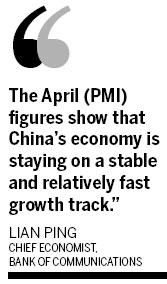BEIJING - The Purchasing Managers' Index (PMI) of China's manufacturing sector surpassed 50 percent in April, the 14th straight month the index exceeded the critical point, indicating China's continued economic growth, but analysts warned of rising inflationary pressures due to the rising cost of imported raw materials.
The PMI rose to 55.7 percent in April, 0.6 percentage points higher than the previous month, according to a report released by the China Federation of Logistics and Purchasing (CFLP).
The PMI is a gauge of China's manufacturing activity and foreign trade trends. A reading above 50 percent indicates that the nation is experiencing economic growth, while one below 50 percent signals decline.

"The April figures show that China's economy is staying on a stable and relatively fast growth track," said Lian Ping, chief economist with Bank of Communications.
A paper released recently by the Chinese Academy of Social Sciences said China's economy is expected to gain further momentum this year, after having experienced sluggish growth in 2009.
However, analysts are also concerned about increasing inflationary pressures as one of the 11 sub-indexes, the purchasing prices index, which signals the inflationary level, jumped to the highest since the second half of 2008.
The PMI purchasing prices index surged to 72.6 percent in April, an increase of 7.5 percentage points over the previous month. Since November last year, the index has remained above 60 percent.
"Signs of inflationary pressures are becoming evident, which could also explain the central bank's decision to raise the deposit reserve requirement ratio," said Lian.
"It (the announcement) comes a day after the release of the PMI, which is partly due to growing government concern over inflationary pressures," he added.
On Sunday, China raised banks' reserve requirements by 50 basis points, the third increase of this magnitude this year, in a bid to calm the surging economy.
Zhang Liqun, a senior researcher with the Development Research Center of the State Council, said the fast pace of growth in purchasing prices would significantly increase production costs and would add to the burden on local manufacturers.
"We need to pay close attention to the possible difficulties that they are facing, as prices of oil, gas, water and electricity are all rising," Zhang said.
The order index for exports, another sub-index of the PMI, remained unchanged at 54.5 percent compared with March, and the CFLP cautioned the "recovery of China's exports this year would be hampered due to uncertain future global economic outlook". But analysts said they have full confidence in the prospects for foreign trade in 2010.
"The growth of China's exports is expected to reach 20 percent in 2010," said Dong Xian'an, chief economic analyst of Industrial Securities.





